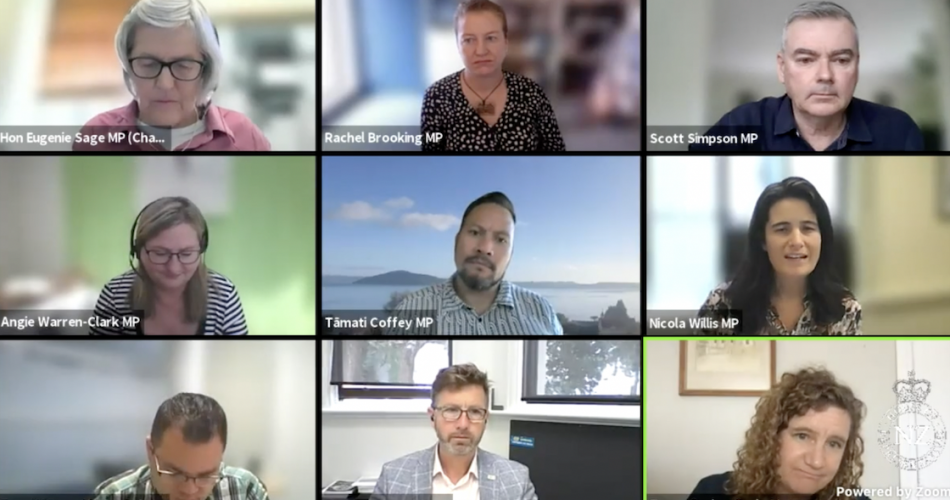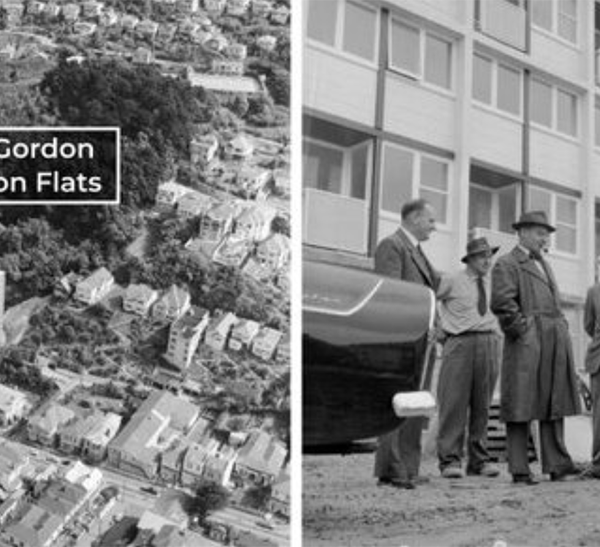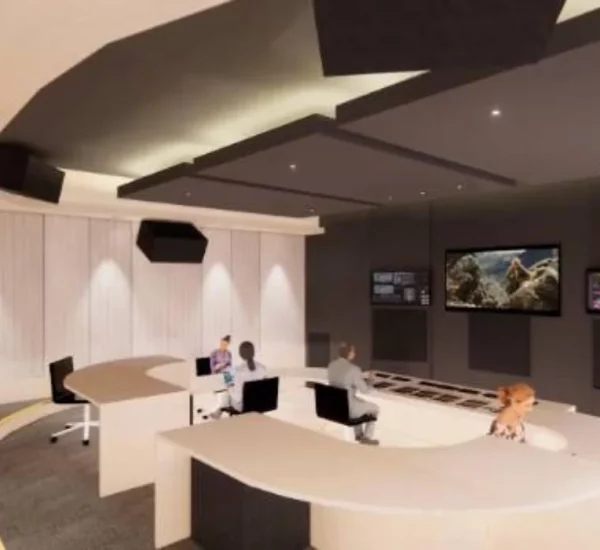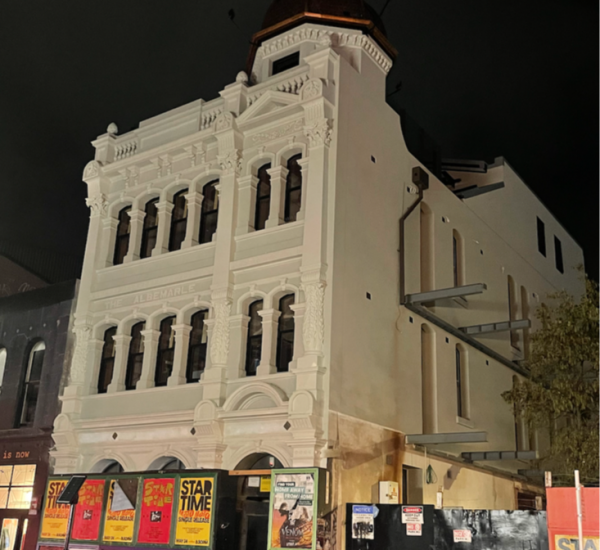At least, that seems to be the view of the vast majority of people commenting on the Resource Management (Enabling Housing Supply and Other Matters) Amendment Bill, (RMEHSOM), which is being rammed through Parliament with indecent haste. Haste so hasty in fact that the Environment Select Committee was sitting on Saturday, which also happened to be the most glorious hot Saturday of the summer so far. Most people and organisations said a version of the following:
- It’s too fast (3 weeks consultation only)
- It’s too broad (blanket rules will not work for everywhere)
- It’s going to result in shit buildings and shit environments (everywhere)
- There’s no room for trees and not enough room for outdoor spaces.
- Extending the MDRS rules from the current planned intensification corridors, to basically everywhere in the entire Tier 1 cities, is a step towards disaster.
- It tramples on the carefully worked out rules of existing Councils, that took 3 years to hammer out in the case of Auckland, and that Wellington is in the middle of.
But not everyone agrees with that. In fact, TALK Wellington says almost the opposite. They say:
“I support more people being able to live close to things we all need, in places that are more socially, economically and environmentally good. To improve the Bill I suggest the following:”
- Amend MDRS to remove front and side setbacks. Suggestion: 0m of front yard boundary, 0m of side yard boundary, 1m of the rear boundary
- Raise / remove the 3 dwelling cap
- Allow for communal outdoor space. Suggestion: One per unit of at least: 15m2 for houses at ground floor, with a minimum dimension of 3m and 8m2 for houses with no ground floor, with a minimum dimension of 1.8m OR one per every 5 units of at least 10m2 of communal outdoor space, with a minimum dimension of 6m.
- Immediately extend MDRS to Tier 2 urban environments
- Limit use of character as a qualifying matter
- Remove changes to Policy 3(d) of NPS-UD
- Provide incentives for accessibility, universal design, hydrological neutrality, low emissions construction, and biodiversity enhancement
- Create exemptions from planning rules, for iwi. (Talk Wellington, 2021, submission on their website).
I’m deeply concerned, when Talk Wellington, a friendly, urbanist website run by eco-friendly, left-leaning, bicycle-using, intelligent people, are in agreement with Don Brash, who is renown for having expoused views so right-wing and racist that even the National Party had to walk away from him. Something very strange is going on! Don’s view is noted here:
“But now in a ray of hope, this Bill goes directly to the core of the problem – the crushing effect of discretionary social control over changes in your neighbour’s land uses initiatives. This Bill carves out of the stifling web of planner/lawyer control a limited restoration of the “right to build” that was the essential strength of the property rights we inherited, embodied in Article 2 of the Treaty. It was simple – that the lord in his manor and the peasant in his hovel were equally entitled to enjoy their property to the exclusion of others. No prince or priest could tell them what they could, and could not, do on their own land.” (Dr Don Brash, 2021, submission to the Bill).
Notwithstanding the archaic and elitist language that is so essentially part of Don Brash’s world view (does Article 2 of the Treaty really say lord in his manor and peasant in his hovel?), he is saying the same thing as “remove the 3 dwelling cap” and “Amend MDRS to remove front and side setbacks” that Talk Wellington is saying above.
By contrast, and with varying degrees of politeness, the huge majority of respondents were saying things like:
“The lack of engagement with local government and residents of Tier 1 cities to date is incredibly disappointing. The Bill, as proposed, will have significant impacts on councils’ place-making, land-use and infrastructure planning work, as well as on our local communities and neighbourhoods. A collaborative partnership between local and central government would bring better housing outcomes than a blunt, one-size-fits-all legislative approach.…
Insofar as this Bill is concerned, if we do not take a stand against those that wish to override the will of the people, it will be the death knell for local government. The stakes could not be higher and our democracy is under assault.… It is widely accepted that New Zealand has a housing accommodation problem. However, a “one-size-fits-all” solution is not the answer for New Zealand’s Tier 1 cities. In all likelihood, it will create more long-term problems than it is purported to solve, in the short term.” (David Lynch, Momentous Public Relations, 2021, submission to the Bill).
Well actually, that “death knell for local government” bit was only said by David Lynch (presumably not THAT David Lynch of Twin Peaks fame, but another one), but I got the impression that many other people would agree with that if they had thought of it in time. Well, nearly everyone. Someone a lot gentler than David, called Briarlee says: “Native Sanctuaries are better. Can we focus on independant living than these 3bed connected homes. Haybail and hempcrete techniques can get the job done faster. My Marae- is a holistic housing company I’d like the govt to adopt for our people. Features a marae with shared facilities and independant units for occupants in a live in re introduced native habitat. With a farm for food this marae can be used to repopulate native species.” (Briarlee Tutauha, 2021, entire submission to the Bill).
Last word for now to go to the wonderful national treasure Ben Schrader:
- “Stop the city-wide approach to intensification and refocus efforts on areas beside transport corridors and suburban centres where its more possible to provide the infrastructure material and immaterial to make medium density housing work as well as it should. This includes local provision of public and green spaces for the residents that live in the dwellings.
- Ensure that intensification projects meet high design standards. Make sure new dwellings have access to sun and are not in permanent shade. This is important for both mental and physical health.
- Acknowledge that a blanket approach to intensification is flawed and regulations need to take account of local conditions.
- Re-establish citizens rights to appeal to the Environment Court (or another review body) developments that could seriously affect the liveability of their homes or destroy local cultural heritage. It is unacceptably undemocratic for this existing right to be stripped away.” (Ben Schrader, 2021, submission to the Bill).





For those interested in Article 2 of the Treaty:
Ko te tuarua (Article 2):
“Ko te Kuini o Ingarani ka wakarite ka wakaae ki nga Rangitira ki nga hapu – ki nga tangata katoa o Nu Tirani te tino rangatiratanga o o ratou wenua o ratou kainga me o ratou taonga katoa. Otiia ko nga Rangatira o te wakaminenga me nga Rangatira katoa atu ka tuku ki te Kuini te hokonga o era wahi wenua e pai ai te tangata nona te Wenua – ki te ritenga o te utu e wakaritea ai e ratou ko te kai hoko e meatia nei e te Kuini hei kai hoko mona.”
Article the second:
“Her Majesty the Queen of England confirms and guarantees to the Chiefs and Tribes of New Zealand and to the respective families and individuals thereof the full exclusive and undisturbed possession of their Lands and Estates Forests Fisheries and other properties which they may collectively or individually possess so long as it is their wish and desire to retain the same in their possession; but the Chiefs of the United Tribes and the individual Chiefs yield to Her Majesty the exclusive right of Preemption over such lands as the proprietors thereof may be disposed to alienate at such prices as may be agreed upon between the respective Proprietors and persons appointed by Her Majesty to treat with them in that behalf.”
The worry that I have is that the Select Committee adjudicating over all this is the Environment Committee, who on Saturday were all confessing that they felt like they were in a lecture of Urban Design 101 for Beginners. The Chair of the Committee is Green MP Eugenie Sage, who does appear to be aware of the issue, very respectful, and rather switched on to the issues of running Zoom submissions, but other members include ACT MP Simon Court, Labour MPs Rachel Brooking, Tamati Coffey, Angie Warren-Clarke and Anahila Kanongata’a-Suisuiki, Shanan Halbert, and Tangi Utikere, while National MPS are Scott Simpson and Nicola Willis.
Actually, while Sage and Brooking spoke often, and Court and Willis spoke only occasionally, the rest of the team sat there on Zoom like smiling / scowling cardboard cutouts, not saying a single thing. Does Scott Simpson not possess the power of speech? Is Shanan Halbert a human, or just a gummy worm with a human mask on? We all know that Tamati Coffey can present the news and weather and talk quite well, but not a single question passed his lips.
I’m curious, and sad, that our democracy and our built future is left in the hands of people with such a lack of intellectual interest.
Anyone would think it was a contest to see how many proles you can stack into 7 storeys of 20 square metre apartments.
Stack ’em high!
I can’t figure out if you like what planners do or not.
As to political parties, think it’s pretty important to note ACT are the only ones opposing this bill.
As to Schrader, he’s spent most of the past year arguing against intensification of suburban centres and beside transport routes, so it’s hard to take that submission seriously.
Conor, I think you’ll find I’ve spent most of the last year arguing exactly what I said in my submission and made similar points in my DSP submission last year. I’ve long supported the intensification of the city. My concern has always been that it needs to be done in such a way that provides a good balance between the old and new and that it is undertaken using good urban design principles that will improve the quality of city life and not make it worse.
At this moment I am looking out at eight new townhouses being built next to the former Northland Fire Station on a site where one house once stood. It is sited opposite the Northland shops and has a bus stop out the front. The fire station was converted to apartments years ago. The townhouses are three storeys high but do not block the sun to the neighbouring apartments. It is a brilliant example of the new respecting the old and density done well. This is a model that could be copied across the city. Maybe you should go and have a look…
Aaah, Conor, you see: Architects and Planners rarely see eye to eye. Traditional rivalries I guess: architects see themselves as free thinkers, breakers of rules, able to create fresh visions where none stood before.
Planners, on the other hand, like to make the rules, to make rules that both they and other people may follow, and then to adjudicate on them when something falls outside the rules. There are some bad planners, just as there are some bad architects.
But whether I like planners or not is hardly relevant here. This is the case of a law (rule) being imposed (or in this case, removed), by a politician (Minister Parker, Minister Wood), and that’s what I really hate: politicians poking their nose in when they don’t know what they are doing.
Nothing is being imposed. Rules are being removed. On most sites architects will soon have more freedom.
Yes, that’s what I meant. And I have no doubt that when work is being done by an architect, they will try their very best to make it as good looking as possible, and as in context as possible – but those will not necessarily be the most desirable traits for the average builder/developer. It is, sadly, as Bill English once said: “We may just have to get more ugly” – and I never liked Bill English. He and I don’t see eye to eye.
All things being equal, good design will win. Our old suburbs (think single bay villas in Mt Eden) are full or carbon copy housing. Design some great homes that comply with the new regs and put them out at scale. Seems like such an awesome opportunity for an architect.
Just in case you haven’t seen it today, over on Greater Auckland, there is a massive stoush brewing between those that think this Bill is a good thing, and those that do not.
https://www.greaterauckland.org.nz/2021/11/24/an-anti-housing-trojan-horse/
Interesting couple of items appearing in the press lately. Firstly, today in the DomPost, Eugenie Sage has an OpEd noting how the Bill as it stands may have some inequities and lead to problems, so she is quite firm that it needs to change. Remember – she is the Chair of the Select Committee that is meeting to discuss it.
“Gaps in Density fix needs work” is the article – can’t find a link to iy yet.
But then there is also another side of the view from Nicola Willis, newly risen star and deputy dawg at National this week: https://www.stuff.co.nz/national/politics/300467324/housing-advocates-urge-national-to-stay-the-course-on-bipartisan-deal-to-force-councils-to-allow-more-homes
“Willis, who is retaining the housing portfolio and was key to getting her own party over the line on the bill, told Stuff on Tuesday night National was keen to put forward some amendments to give “more discretion” to local councils.
”As Christopher [Luxon] said today, we have seen through the submission process very clearly that there is a need for local authorities to have more discretion than is currently provided for in the bill and to ensure that there are better design standards,” Willis said.”
Not quite sure where to post this link, but it belongs with this article, so I’ll stick it here:
https://www.stuff.co.nz/business/property/127234971/concerns-raised-over-unintended-consequences-of-housing-infill-bill
Delightful illustration about: “Domett St resident Tim Bayley has set a pole on his property illustrating the boundary building height and recession angle that would be allowed for new developments in the Government’s proposed housing infill legislation.”
“The real ambiance of family neighbourhoods is generated by this issue of density – and to suddenly allow the density to be grossly increased will destroy these communities.”
“It’s a fundamental aspect of New Zealand’s way of life, without it, you will greatly increase the number of seriously depressed people.”
He said this could result in residential landscapes akin to parts of China or the suburbs of Moscow “which are crammed full of state housing – built cheek to jowl – with no landscape in horrid box-like structures with small windows”.
Tim Bayley said while there was a need for housing to intensify and go up, it needed to be in spaces where it would not disproportionately affect others.
“I think there’s some sound ideas, you can intensify areas to a certain extent – but you must do it with the semi-agreement of your neighbours, not as of right.
“You’ve got to fit in with the character of your neighbourhood.”
I really like the potential of pattern zoning. Here is a link:
https://slate.com/business/2021/04/good-design-bad-cities-zoning-commissions-preservation-boards.html
And the important bits for the TLDR brigade:
“The city of Bryan, Texas, is experimenting with a similar program that aims to jump-start the construction of “missing middle housing,” the type of small, multifamily infill that once populated urban neighborhoods across the country. Bryan, which sits directly adjacent to College Station and Texas A&M University, is trying a technique called “pattern zoning.” As of fall 2020, the city has four designs on file for its Midtown area, which can be downloaded, remixed, customized, and deployed free of charge—permit included.
The designs for the Midtown Pattern Zoning, which won a charter award from the Congress for the New Urbanism, have porches and gables and peaked roofs, board siding, and white trim against darker base coats. They achieve what has been called “stealth density”—multifamily buildings that fit the mold of traditional single-family homes. If it is a deviation from context that gets neighbors riled up about new buildings, they will have little recourse to complain here.
We’re interested in alternative models for distributing missing middle housing, because nothing we’re doing seems to be working,” said Matthew Hoffman, the Arkansas-based architect who managed the project and designed the preapproved houses. “Much as I am frustrated by NIMBYism, it’s incredible pernicious, but they have a point that most of the stuff that’s been delivered just fucking sucks.” He is bothered by the notion of “neighborhood character” being some kind of proto-racist term: “Actually, it’s a really good idea! There are beautiful neighborhoods in this country that are both diverse and beautiful. The idea that it’s something that happened in the past that we can’t do anymore? That’s incredibly sad.”
Even a well-intentioned code, Hoffman said, is full of rocks upon which the ship of good design can be dashed. The easiest path through competing requirements never produces the best building, and that’s before neighbors have their say. With these blueprints, Bryan is giving would-be builders a map. “We want people in the neighborhood to have the tools to participate in the growth of their neighborhood, literally. All the people who walk around and say, ‘Somebody oughta.’ ” The people for whom navigating the code and hiring an architect might be too much. The designs are right here.
Bryan developers are still welcome to go the conventional route. “All we’re saying is: If you want an expedited permit and a free design, this is how we’d like you to do it.” Does it sound like a cookie-cutter design? It is. But it’s quick and it’s handsome. You can have your cookie and eat it too.”
https://www.stuff.co.nz/national/politics/300478047/sweeping-townhouse-bill-passes-into-law-with-support-of-labour-and-national-will-force-councils-to-allow-more-homes
And so the Bill passes into law.
“A sweeping bill forcing councils to allow townhouses to be built has passed into law with the support of Labour and National. The Resource Management (Enabling Housing Supply and Other Matters) bill was hammered out between the two major parties so is unlikely to be reformed under any change of Government.
From August of 2022, councils will be forced to allow townhouses of up to three storeys with up to three dwellings on almost all residential sites in Auckland, Wellington, Christchurch, Tauranga, and Hamilton, as these will not require resource consent. Building consent will still be required, so the quality of the homes themselves will still need to meet a standard.
Analysis by PwC suggests it could add up to 105,000 new dwellings in those cities over the next eight years. The bill also moves forward the timeline on the NPS-UD, another zoning change that removes the ability for councils to set height limits of less than six storeys in a more restricted set of urban areas.”
I hate this concrete shack design and new colourless wasteful 2 story urban builds. It’s slumy. Reakon we look like we imatating england slums. Urban’s need to have community garden with livestock every suburb with library wifi, printer, laptop, phone.Make them a 24/7 drop in center. Hosting neighbourhood projects like men’s shed, women’s updates and children’s playstation games. Can have Sunday bbqs too.
I want to get rid of crown and build self contained and water powered by faucet homes on crown council land. I believe people should be able to rent land to own to build dream home not replicate the slums by property developers. Then we would see diversity in housing fleet. Intensification of urban housing was a decoy to imploy more cruelty. I believe military state was being implemented with the same amendment.